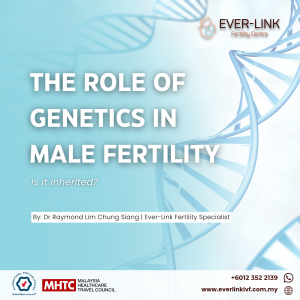
Male fertility is influenced by multiple factors, including lifestyle, environment, and genetics. But can fertility issues be passed down through generations? In this article, we’ll explore the genetics behind male fertility and whether infertility runs in families.
How Genetics Influence Male Fertility
Genes play a crucial role in sperm production, hormone regulation, and overall reproductive function. Certain genetic mutations and chromosomal abnormalities can directly impact fertility potential. Some of the most common genetic factors affecting male fertility include:
- Y-Chromosome Microdeletions (YCMD) – Missing sections of the Y chromosome can lead to low sperm count or complete absence of sperm (azoospermia).
- Klinefelter Syndrome (XXY Syndrome) – A condition where a man has an extra X chromosome, often leading to reduced testosterone and poor sperm production.
- Cystic Fibrosis Gene Mutations – Some men with cystic fibrosis or carriers of the CFTR gene mutation may lack the vas deferens, preventing sperm from reaching the semen.
- Hormonal Gene Mutations – Genes regulating testosterone and other reproductive hormones may impact sperm quality and production.
Does Male Infertility Run in Families?
While not all fertility issues are inherited, research suggests that a man’s family history may influence his fertility potential. If a father or close male relatives had difficulty conceiving, there could be an underlying genetic factor at play. Conditions such as Y-chromosome deletions and hormonal imbalances can be passed down, affecting future generations.
However, not all cases of male infertility are genetic. Lifestyle factors like smoking, obesity, and environmental exposures can also contribute significantly to fertility challenges.
Key Questions About Genetics and Male Fertility
1. Can infertility be inherited?
Yes, in some cases. Genetic mutations related to sperm production, hormone regulation, or anatomical issues can be passed down. However, lifestyle and external factors also play a significant role.
2. Should men with a family history of infertility get tested?
If male relatives have experienced fertility challenges, genetic screening or a semen analysis can provide valuable insights. Early detection can help men explore fertility preservation options or treatment if needed.
3. Can genetic fertility issues be treated?
While some genetic conditions affecting fertility have no cure, assisted reproductive technologies (ART) like IVF with ICSI (Intracytoplasmic Sperm Injection) can help men with low sperm count father biological children.
Understanding Your Male Fertility and Family History
If you’re concerned about the inheritance of fertility issues, consider discussing your family history with a fertility specialist. Genetic testing can help identify potential risks, allowing for proactive decisions about family planning.
Conclusion
Genetics do play a role in male fertility and family history, but they are just one piece of the puzzle. Understanding your genetic background, combined with a healthy lifestyle, can help optimize your reproductive potential. If fertility concerns run in your family, seeking professional advice early on can make all the difference in your journey to fatherhood.

